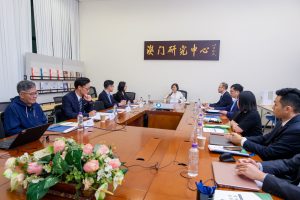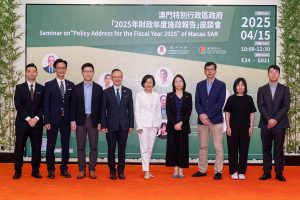The Centre for Macau Studies (CMS) of the University of Macau (UM) held the Seminar on Policy Address for the Fiscal Year 2025 of the Macao SAR Government today (15 April). During the seminar, several experts and scholars interpreted the Policy Address for the Fiscal Year 2025 and made suggestions for the future governance of the SAR government.
The seminar was chaired by Agnes Lam Iok Fong, director of CMS. The experts and scholars agreed with the policy direction of the policy address titled ‘Innovate to elevate; forge ahead to break new ground’. They also agreed that as this year is the first year of the new administration and against the backdrop of the ‘new situation, new demands, and new missions’ facing Macao, the two main directions of development are to strengthen the coordination mechanisms and promote the integration of Macao and Hengqin. They also suggested that raising awareness of the rule of law with responsibility and action among civil servants can improve the governance capacity and effectiveness of the SAR government. This, in turn, will enhance Macao citizens’ sense of participation, satisfaction, and happiness, and fulfil their aspirations for a better life.
Tong Kai Chung, president of the Macau Institute of Management, made suggestions on optimising fiscal policy, facilitating the flow of factors within the Guangdong-Hong Kong-Macao Greater Bay Area, and promoting the integration of Macao and Hengqin to support Macao’s economic diversification.
Wong Seng Fat, associate professor in the Department of Electromechanical Engineering of the Faculty of Science and Technology at UM, provided policy recommendations for smart cities and technological innovation.
So Siu Ian, associate professor in the Department of Integrated Resort and Tourism Management of the Faculty of Business Administration at UM, shared insights on how to promote Macao’s tourism industry.
Fong Hoc Nang, associate professor in the Department of Integrated Resort and Tourism Management of the Faculty of Business Administration at UM, stressed the need for policies to cater sub-industries, promote interdisciplinary development, and boost the local retail market.
Lei Chun Kwok, associate professor in the Department of Finance and Business Economics of the Faculty of Business Administration at UM, discussed the economic situation of Macao, the integration of Macao and Hengqin, and the development of small and medium-sized enterprises.
Kwan Fung, assistant professor in the Department of Economics of the Faculty of Social Sciences at UM, discussed the suspension of the sandwich-class housing scheme, the newly-introduced childcare allowance, and the lack of measures to improve economic output of the Greater Bay Area.
Lam Ka Ian, assistant professor in the Department of Government and Public Administration of the Faculty of Social Sciences at UM, discussed the future development direction of the integration of Macao and Hengqin, the welfare measures regarding the elderly and the young, and the accountability of civil servants.
Sou Kuai Long, assistant professor (by courtesy) in the Department of Psychology of the Faculty of Social Sciences at UM, advocated for diverse policies to address low birth rates and inadequate support for the psychological development of young people.
Pun Chi Meng, secretary-general of Caritas Macau, suggested promoting physical and mental health for all, increasing the opportunities for young people to participate in international exchanges, and raising awareness of the value of life among Macao citizens.
| Source: Centre for Macau Studies | |
| Media Contact Information: | |
| Communications Office, University of Macau | |
| Albee Lei | Tel: (853) 8822 8004 |
| Jason Leong | Tel: (853) 8822 8322 |
| Email: | prs.media@um.edu.mo |


